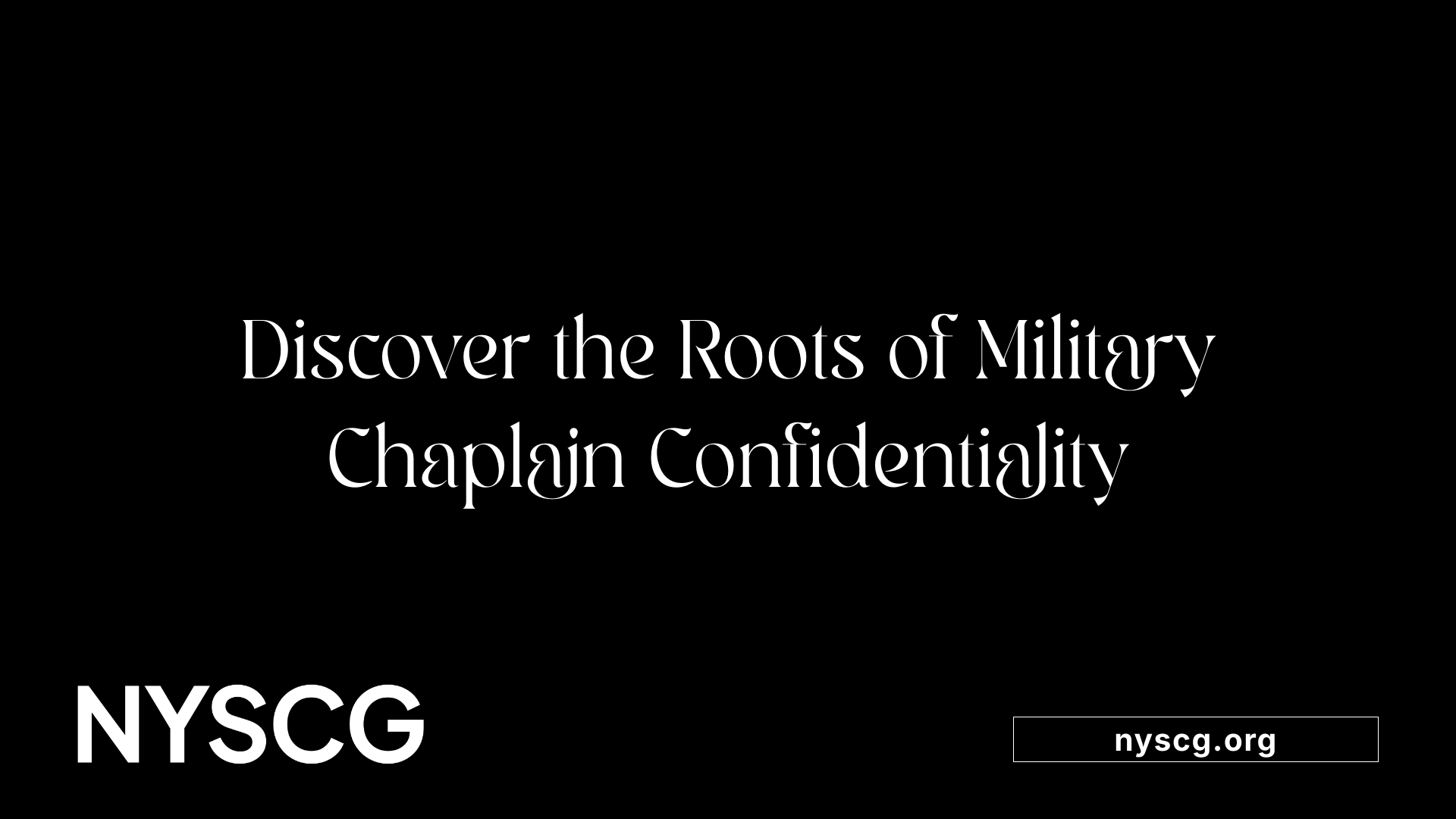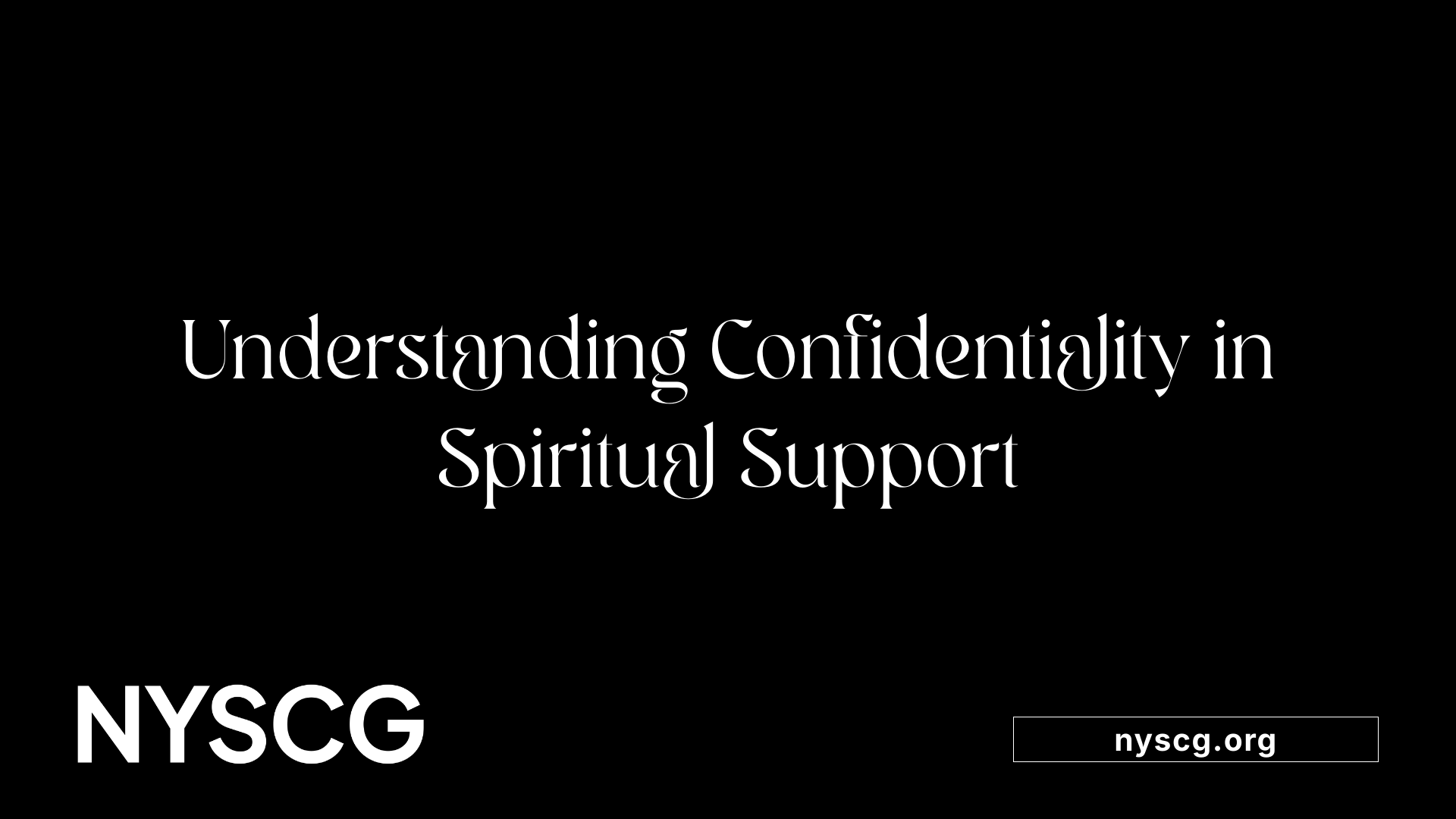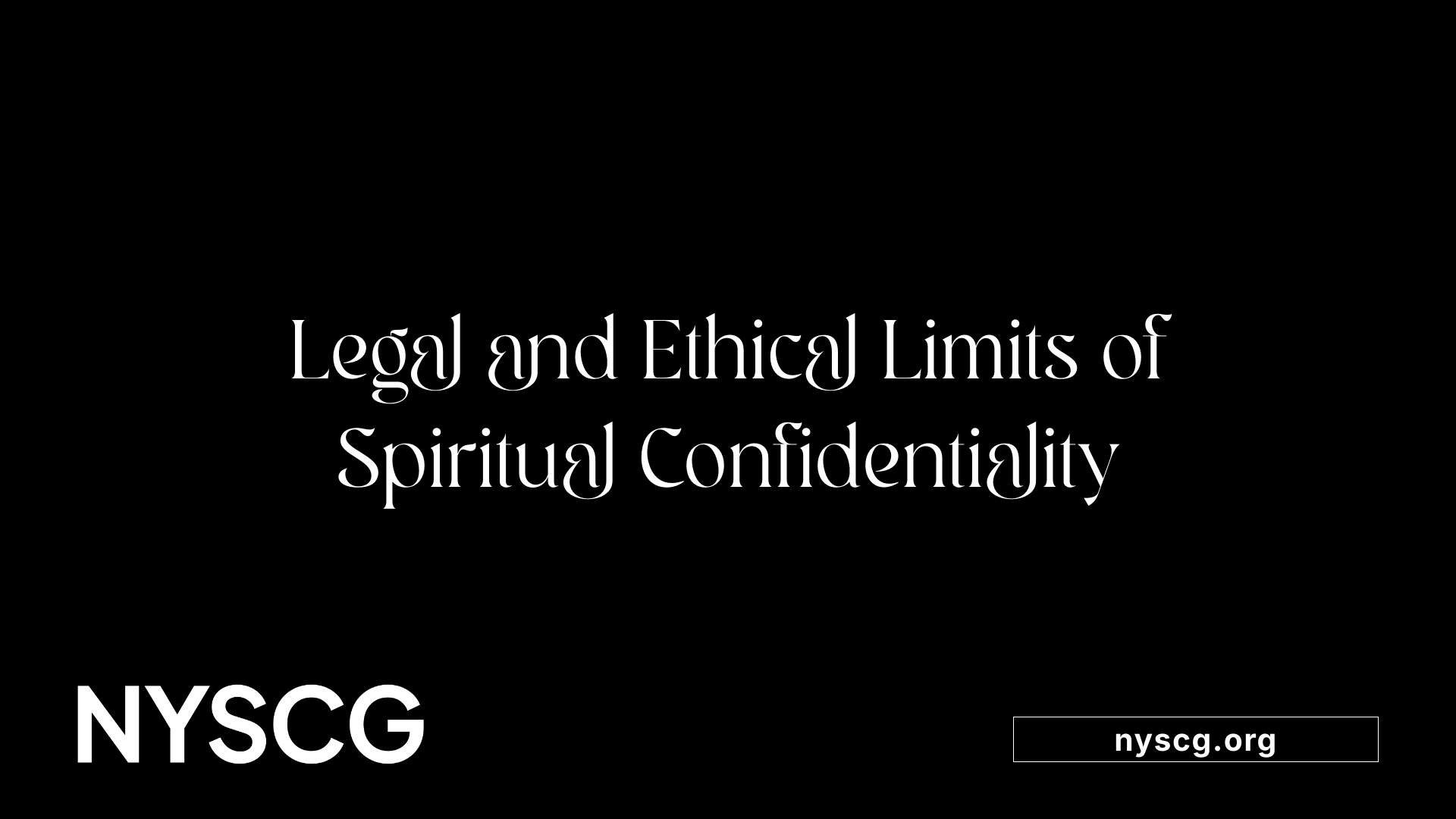Do Chaplains Have Legal Confidentiality Rights?


Chaplains serve as trusted counselors and spiritual guides, providing confidential support across military, workplace, and community settings. But what legal protections shield these confidential communications? This article explores the scope, limitations, and legal foundations of chaplain confidentiality, emphasizing its significance for both clients and spiritual caregivers.

The concept of confidentiality for military chaplains has roots stretching back over 80 years. It was established as a sacred safeguard to protect the privacy of communications between soldiers and their spiritual advisors. This confidentiality encourages trust, ensures spiritual freedom, and supports the mental and emotional well-being of service members.
The legal foundation of chaplain confidentiality was solidified during the 1940s through important regulations and directives. A significant step was the War Department Circular 108, issued in 1944, which explicitly recognized and protected communications made to chaplains as a matter of religious practice. Following this, various Army regulations reinforced these protections, embedding confidentiality as a core principle of military spiritual support.
A landmark legal affirmation came with the Supreme Court case U.S. v. Trammel in 1980. This ruling acknowledged and reaffirmed that communications with clergy, including military chaplains, are absolutely confidential. The decision recognized the importance of these communications for the free exercise of religion and established that such privileged conversations cannot be disclosed without the individual's consent, extending protections even in criminal proceedings.
The legal rights of chaplains to confidentiality are broad and well-protected across all 50 states and the military. These privileges ensure that any communication related to religion, conscience, or personal counseling remains confidential and cannot be disclosed in court unless the individual explicitly waives this right. Exceptions to this confidentiality include situations involving child or elder abuse, imminent harm, or if the individual willingly discloses information. This legal protection fosters an environment of trust where service members, families, and even prisoners of war can speak openly without fear of exposure.
Chaplains are mandated to secure the privacy of all sensitive information shared during spiritual care or counseling. These protections are supported by federal and state laws, including military regulations that explicitly recognize and uphold privileged communication. This scope covers spoken words, written correspondence, and electronic messages, extending beyond the individual’s death. Confidentiality applies whether the communication is made in private, during formal religious acts, or in personal discussions, ensuring trust remains intact in all contexts.
While confidentiality is robust, certain circumstances warrant exceptions. Mandatory reporting laws in all 50 states require clergy, including chaplains, to report suspected child or elder abuse. The law also permits disclosures when there is an imminent threat to life or safety, such as suicide risk or violence. Military regulations, like Rule 503 of the Uniform Code of Military Justice, specify that communications made as a religious act are protected unless overridden by operational needs or legal obligations. Additionally, disclosures necessary for safety, legal proceedings, or ethical mandates can limit confidentiality. These exceptions aim to balance individual privacy with societal and legal responsibilities.
In military and workplace environments, chaplains enjoy protected confidentiality rights grounded in both historic legal frameworks and current statutes. Since the 1940s, these rights have been reinforced by court rulings such as U.S. v. Trammel and military regulations like UCMJ Rule 503. Communications as acts of religion or conscience are privileged and can't be disclosed unless the individual consents. This protection applies whether supporting prisoners of war, providing spiritual guidance to service members, or counseling employees, ensuring that trust is maintained and that individuals can seek support freely.
Privacy laws significantly bolster the confidential relationship between chaplains and clients. Federal statutes, along with state laws, establish clergy-communicant privilege, which designates certain communications as legally protected. This legal framework encourages individuals to seek spiritual and mental health support without fear of disclosure. Violating these laws can result in legal consequences, damage to trust, and undermine the effectiveness of spiritual care. Thus, privacy laws are essential in maintaining the integrity and confidentiality of chaplain services.
The legal protections for chaplain confidentiality are rooted in a combination of statutes recognizing clergy-penitent privilege, military regulations, and court decisions. The landmark case U.S. v. Trammel reaffirmed the privilege of confidential communication with clergy. Military regulations like Rule 503 of the UCMJ explicitly protect these communications within the armed forces. Civil laws across states also uphold the confidentiality of confessional communications, barring exceptions like threats or abuse disclosures. Together, these legal frameworks protect the sanctity of spiritual conversations and encourage openness and trust in spiritual support contexts.

Confidentiality in religious and pastoral settings is a vital ethical and legal principle designed to protect individuals’ privacy when they seek spiritual guidance or support. This obligation encourages trust, honesty, and openness, fostering a safe environment where individuals feel comfortable sharing sensitive issues.
In these contexts, confidentiality covers a wide range of communications, including spoken words, written messages, and even digital correspondence like emails and texts. It remains in effect beyond the end of the counseling relationship and, in some cases, even after the individual's death.
Religious scriptures underscore the importance of maintaining confidentiality. For example, Proverbs 11:13 emphasizes trustworthiness, while Matthew 18:15 advocates private resolution of conflicts. Such scriptures highlight the moral foundation for discretion and trust within spiritual relationships.
Clergy, including chaplains and pastors, have a primary duty to safeguard what is shared in confidence. This helps cultivate an environment where individuals can openly discuss personal struggles, spiritual concerns, or moral dilemmas without fear of exposure.
However, this confidentiality has limits. Legal statutes and mandatory reporting laws require clergy to disclose certain information, especially in cases involving child abuse, elder abuse, or threats of harm to oneself or others. These obligations are designed to protect vulnerable populations and uphold public safety.
Balancing legal duties with spiritual commitments necessitates careful policy development, ongoing legal consultation, and ethical sensitivity. Clergy should clearly communicate confidentiality boundaries to those they serve, outline circumstances where disclosures are necessary, and exercise discernment to uphold trust while complying with the law.
In the military and legal contexts, such as with chaplains, confidentiality is protected by law and reinforced through regulations stemming from court decisions like U.S. v. Trammel (1980). This legal backing affirms the sacred trust between the individual and the spiritual counselor, establishing that most communications are privileged unless specific exceptions apply.
Ultimately, maintaining confidentiality sustains the integrity of spiritual care services. It encourages individuals—be they service members, law enforcement officers, or civilians—to seek help without fear, thereby promoting psychological resilience, moral healing, and overall well-being.
| Aspect | Details | Additional Notes |
|---|---|---|
| Foundations | Biblical scriptures such as Proverbs 11:13 and Matthew 18:15 emphasize trust and discretion | They establish moral standards for confidentiality |
| Legal Protections | Recognized across all 50 states, including protective laws in Minnesota and others | Most states uphold clergy privilege unless exceptions like harm or abuse apply |
| Exceptions | Child abuse, elder abuse, imminent harm, or when a transcript is legally mandated | Confidentiality can be overridden but only under specific circumstances |
| Application | Used by military chaplains, law enforcement spiritual counselors, and religious leaders | Helps promote wellness, trust, and moral integrity |
| Jurisdiction | Confidentiality Status | Notable Exceptions | Legal Citation |
|---|---|---|---|
| All US States | Privileged unless laws specify otherwise | Abuse, harm, or legal mandates | Varies by state, e.g., MN Statute 260E.06.3, California Exemptions |
| Military | Protected as part of service law | Abuse or threats of violence | DoD and military regulations |
| Federal Law | Recognized in court as privilege | Criminal investigations or safety threats | Federal rules and Supreme Court rulings |
This understanding underscores the importance of transparency, ethical conduct, and ongoing awareness of legal obligations. It enhances the role of spiritual caregivers as trustworthy allies in personal and professional crises, while respecting the sacred duty of confidentiality.

Chaplain confidentiality is rooted in a complex framework of legal statutes, professional ethics, and religious principles. Over the past 80 years, this confidentiality has been safeguarded by laws, regulations, and court decisions, establishing a sacred trust that ensures conversations between service members, their families, and chaplains remain private.
Legally, the confidentiality of communications with military chaplains was first reinforced in the 1940s and further supported by regulations such as the War Department Circular 108 (1944). The Supreme Court case U.S. v. Trammel in 1980 solidified the absolute nature of this privilege, affirming that communication with military chaplains is protected from disclosure unless the individual explicitly waives their rights.
This legal protection extends across all U.S. states, including Minnesota, where statutes such as MN Statute 595.02.c specify that chaplains cannot be compelled to testify about confidential conversations in court. This privilege covers communications in various contexts, including military settings, prisons, and academic environments, highlighting the importance of confidentiality for supporting spiritual wellbeing.
However, these protections are not absolute. Exceptions exist for situations where there is child abuse, elder abuse, or imminent harm to oneself or others. For example, Minnesota law (Statute 260E.06.3) requires reporting suspected child abuse, which may conflict with confidentiality. Similarly, law enforcement may access certain information if specific legal thresholds are met. Yet, in most cases, a service member or family’s conversation remains protected unless they choose to disclose it willingly.
Ethically, chaplains are bound by professional standards to respect the trust placed in them. They must carefully balance confidentiality with their duty to protect and prevent harm. This includes understanding mandatory reporting requirements while also honoring the sanctity of spiritual and personal conversations. Chaplains are trained to handle disclosures of sensitive issues such as abuse, mental health crises, or threats, guiding individuals to appropriate resources or authorities when necessary.
In the context of law enforcement, chaplains provide confidential support to officers, helping with resilience and moral injuries. These interactions are recognized as privileged, similar to attorney-client or psychotherapist-client privileges, encouraging officers to seek help without fear of disclosure.
Furthermore, confidentiality also applies to written communication, including emails, texts, and letters, extending beyond the end of the counseling relationship and even after a person’s death. This ongoing protection aligns with the core principles of respecting client autonomy and privacy.
Understanding and navigating these boundaries require knowledge of both legal statutes and ethical standards. Chaplains must clearly communicate the limits of confidentiality at the outset of their relationships, ensuring that individuals are aware of potential exceptions. This transparency fosters trust and helps prevent misunderstandings.
In practice, maintaining confidentiality involves diligent record-keeping, secure storage of sensitive materials, and ongoing ethical reflection. When conflicts arise between legal obligations and the duty to preserve trust, chaplains prioritize client welfare, seeking guidance from legal counsel or ethical frameworks as needed.
In conclusion, the boundaries of chaplain confidentiality are designed to protect the individual's right to privacy while balancing the need to prevent harm and uphold legal standards. By understanding these limits, chaplains can provide effective, respectful, and legally compliant spiritual care, reinforcing the essential human need for confidential, trustworthy support.
Below is a summary table of the main legal and ethical considerations:
| Aspect | Description | Applicable Laws/Principles |
|---|---|---|
| Confidentiality Protections | Ensuring communication remains private | Supreme Court's U.S. v. Trammel; State statutes |
| Exceptions | Legal mandates for disclosures | Child/Elder abuse, imminent harm, court orders |
| Scope | Who is protected and by what means | All 50 states, federal laws, military regulations |
| Written Communications | Extends beyond spoken words | Emails, texts, letters—protected after relationship ends |
| Ethical Responsibilities | Balancing trust with legal duties | Beneficence, autonomy, fidelity |
| Role of Chaplain | Maintaining trust and safeguarding privacy | Clear communication of limits, secure record-keeping |
By understanding and upholding these boundaries, chaplains serve as vital advocates for spiritual and personal trust, fostering environments where individuals feel safe to confide and seek help without fear of unwanted disclosure.

Clergy-penitent privilege is a legal protection that secure confidential communications made to clergy members, such as priests, ministers, or other religious leaders, preventing their disclosure in legal cases. This privilege is rooted in the need to foster honest and candid spiritual conversations, especially during sacred rituals like confessions or private counseling sessions.
The privilege generally applies when the communication occurs in a context where trust and privacy are expected, and it can often be waived if the penitent or the clergy member chooses to disclose the information voluntarily. The scope of clergy-penitent privilege varies across jurisdictions and circumstances, especially concerning who is present during the communication and whether the communication was made in a religious setting.
While chaplains are not always explicitly covered by clergy-penitent privilege, they are often regarded as having similar confidentiality obligations. Their role in providing spiritual support in settings like the military, prisons, or hospitals involves maintaining a high level of trust, which is protected under laws, regulations, or policies depending on the context.
In essence, both clergy-penitent privilege and chaplain confidentiality serve to safeguard spiritual communications, ensuring individuals can speak freely about personal, legal, or emotional issues without fear of disclosure. This mutual goal promotes trust in spiritual and counseling relationships, encouraging individuals to seek help when needed.
| Aspect | Clergy-Penitent Privilege | Chaplain Confidentiality | Explanation |
|---|---|---|---|
| Scope | Usually applies to confessions, counseling, spiritual advice | Broader, includes formal acts of religion and matters of conscience | Both aim to protect private spiritual conversations |
| Legal Protection | Recognized by courts; can be waived by consent | Recognized and protected by law; unless exceptions apply | Both are legally protected, but specifics vary by role and situation |
| Origin | Rooted in legal traditions, statutes, and case law | Grounded in historical regulations, Supreme Court rulings, and military law | Overlap but also distinctions depending on jurisdiction and context |
| Exceptions | Possible if related to child abuse, harm, or legal investigations | Similar exceptions; child abuse, harm, or legal disclosures | Both have exceptions that may require disclosure under certain circumstances |
| Settings | Confessions, spiritual counseling, private meetings | Military, hospitals, prisons, secular settings | Settings of confidentiality may differ but the principle remains consistent |
| Impact on Disclosure | Designed to encourage honest communication | Designed to promote trust and spiritual wellbeing | Both aims to foster open and effective spiritual support |
Legal protections for clergy-penitent privilege and chaplain confidentiality can differ based on state laws and specific legal statutes. For instance, some states like California require clergy to report suspected abuse but provide exemptions for sacramental confessions.
Other states, such as Texas, mandate reporting suspected abuse with no exceptions for confidential religious communications. Each jurisdiction’s legal framework influences how protections are applied and enforced.
Chaplains and other spiritual care providers must balance respecting confidentiality with legal obligations under mandatory reporting laws. They are trained to navigate these complex issues ethically, emphasizing beneficence and non-maleficence.
In summary, clergy-penitent privilege and chaplain confidentiality both protect sensitive spiritual conversations, fostering trust and openness. While they share common goals, their legal and contextual applications can differ significantly depending on the setting and jurisdiction.
The legal landscape surrounding chaplain confidentiality underscores its vital role in fostering trust and openness between clients and spiritual caregivers. Grounded in historical statutes, reinforced by landmark judicial decisions like U.S. v. Trammel, and supported by state and federal laws, these protections enable individuals to seek spiritual and emotional assistance without fear of unwarranted disclosure. While exceptions exist—mainly to address safety concerns, legal requirements, and client rights—the core principle remains that confidential communications between chaplains and their clients are protected. As religious, military, and workplace environments continue to recognize and reinforce these protections, chaplains are equipped to provide essential support that respects both legal boundaries and spiritual integrity, ultimately strengthening trust and wellbeing in all settings.
All you need is the will to make the world a better place.
New York State chaplain group inc. is a tax deductible organization with a federal tax Id number 92-383-4921